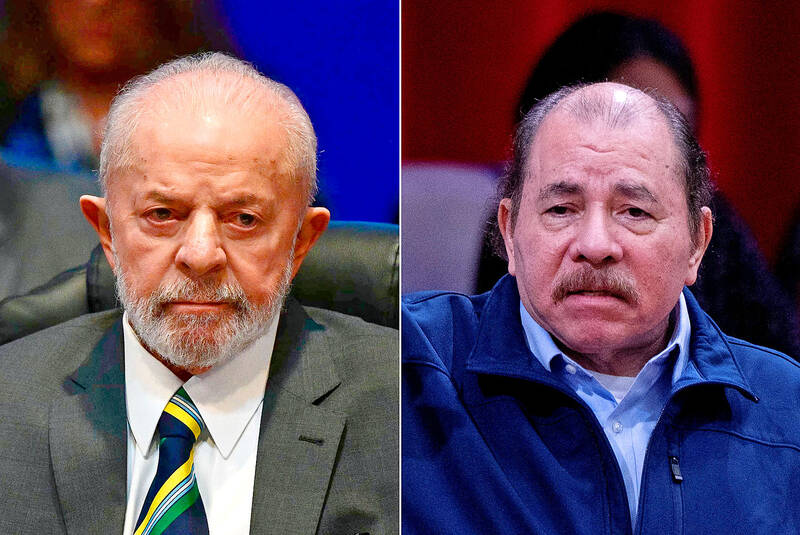Brazil and Nicaragua have expelled each other’s ambassadors in a tit-for-tat diplomatic row, as Brazilian President Luiz Inacio Lula da Silva appears to recalibrate his approach to authoritarian leftist rulers who were once seen as allies.
The dual expulsions this week came amid growing tensions between Lula and another supposedly progressive leader, Venezuelan President Nicolas Maduro, whose claim of re-election the Brazilian president has yet to acknowledge. Lula and his counterparts in Colombia and Mexico have called on Maduro to release voting tallies from all polling stations to support his win.
On Thursday, Brazil announced the expulsion of the Nicaraguan ambassador as an “application of the principle of reciprocity” following Nicaragua’s decision to expel the Brazilian ambassador two weeks ago.

Photo: AFP
Ambassador Breno de Souza da Costa is reported to have refused, under the direction of the Brazilian government, to participate in an event celebrating the 45th anniversary of the Sandinista Revolution, when left-wing revolutionaries overthrew the then-president Anastasio Somoza.
Nicaraguan President Daniel Ortega played a key role in that revolution, but in recent years has overseen an increasingly vicious crackdown on dissent, imprisoning dozens of opposition leaders, including former comrades-in-arms and forcing hundreds of thousands to flee the country.
Nicaraguan Ambassador Fulvia Patricia Castro had only been in the role for three months before she was expelled on Thursday. The same day she was appointed by Nicaraguan vice-president and Ortega’s wife Rosario Murillo as the new minister of family economy.
Brazilian newspaper O Globo said that Brazilian diplomats see Lula’s stance as a strategic move to counter accusations that he has been lenient with Maduro in Venezuela.
Although Brazil has resisted recognizing Maduro’s alleged victory, Lula has faced criticism, particularly from the right, for not following the US, Argentina and other countries in recognizing the opposition candidate Edmundo Gonzalez as Venezuela’s rightful president.
Feliciano de Sa Guimaraes, associate professor of international relations at the University of Sao Paulo, said Lula’s shifting attitude toward Ortega and Maduro reflected the domestic political cost of being seen as supporting two “dictatorships.”
“It’s an adjustment in posture, not a change in posture. It is more about the high domestic cost of being seen close to regimes that are rejected by the Brazilian population,” Guimaraes said.
The relationship between Lula and Ortega, once allies, has been deteriorating for at least a year.
Last year, the Brazilian president responded to a request from Pope Francis and attempted to intervene for the release of Bishop Rolando Jose Alvarez, a critic of Ortega’s authoritarian regime, who was imprisoned on charges of “conspiracy to undermine national integrity and spreading false news.”
The Catholic leader was eventually released in January after more than 500 days in prison, but was forced to leave the country.
Last month, Lula said he had been ignored by Ortega: “The fact is that Daniel Ortega didn’t take my call and didn’t want to speak with me. So, I never spoke to him again, never again,” he said.

A fire caused by a burst gas pipe yesterday spread to several homes and sent a fireball soaring into the sky outside Malaysia’s largest city, injuring more than 100 people. The towering inferno near a gas station in Putra Heights outside Kuala Lumpur was visible for kilometers and lasted for several hours. It happened during a public holiday as Muslims, who are the majority in Malaysia, celebrate the second day of Eid al-Fitr. National oil company Petronas said the fire started at one of its gas pipelines at 8:10am and the affected pipeline was later isolated. Disaster management officials said shutting the

US Vice President J.D. Vance on Friday accused Denmark of not having done enough to protect Greenland, when he visited the strategically placed and resource-rich Danish territory coveted by US President Donald Trump. Vance made his comment during a trip to the Pituffik Space Base in northwestern Greenland, a visit viewed by Copenhagen and Nuuk as a provocation. “Our message to Denmark is very simple: You have not done a good job by the people of Greenland,” Vance told a news conference. “You have under-invested in the people of Greenland, and you have under-invested in the security architecture of this

UNREST: The authorities in Turkey arrested 13 Turkish journalists in five days, deported a BBC correspondent and on Thursday arrested a reporter from Sweden Waving flags and chanting slogans, many hundreds of thousands of anti-government demonstrators on Saturday rallied in Istanbul, Turkey, in defence of democracy after the arrest of Istanbul Mayor Ekrem Imamoglu which sparked Turkey’s worst street unrest in more than a decade. Under a cloudless blue sky, vast crowds gathered in Maltepe on the Asian side of Turkey’s biggest city on the eve of the Eid al-Fitr celebration which started yesterday, marking the end of Ramadan. Ozgur Ozel, chairman of the main opposition Republican People’s Party (CHP), which organized the rally, said there were 2.2 million people in the crowd, but

JOINT EFFORTS: The three countries have been strengthening an alliance and pressing efforts to bolster deterrence against Beijing’s assertiveness in the South China Sea The US, Japan and the Philippines on Friday staged joint naval drills to boost crisis readiness off a disputed South China Sea shoal as a Chinese military ship kept watch from a distance. The Chinese frigate attempted to get closer to the waters, where the warships and aircraft from the three allied countries were undertaking maneuvers off the Scarborough Shoal — also known as Huangyan Island (黃岩島) and claimed by Taiwan and China — in an unsettling moment but it was warned by a Philippine frigate by radio and kept away. “There was a time when they attempted to maneuver